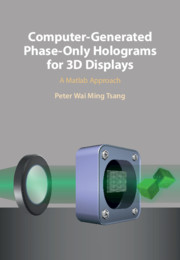Book contents
- Computer-Generated Phase-Only Holograms for 3D Displays
- Computer-Generated Phase-Only Holograms for 3D Displays
- Copyright page
- Contents
- Preface
- Acknowledgments
- 1 Introduction to Digital Holography
- 2 Fast Methods for Computer-Generated Holography
- 3 Generation of Phase-Only Fresnel Hologram
- 4 Conversion of Complex-Valued Holograms to Phase-Only Holograms
- 5 Applications of Phase-Only Hologram in Display, Holographic Encryption, and Steganography
- Index
- References
4 - Conversion of Complex-Valued Holograms to Phase-Only Holograms
Published online by Cambridge University Press: 07 January 2021
- Computer-Generated Phase-Only Holograms for 3D Displays
- Computer-Generated Phase-Only Holograms for 3D Displays
- Copyright page
- Contents
- Preface
- Acknowledgments
- 1 Introduction to Digital Holography
- 2 Fast Methods for Computer-Generated Holography
- 3 Generation of Phase-Only Fresnel Hologram
- 4 Conversion of Complex-Valued Holograms to Phase-Only Holograms
- 5 Applications of Phase-Only Hologram in Display, Holographic Encryption, and Steganography
- Index
- References
Summary
In Chapter 3 a number of methods were described for generating a phase-only hologram of an object. However, these methods are not applicable if the source image of the object is not present, and only its hologram is available. Such a situation happens if a hologram is directly captured from a physical object (for example applying phase-shifting holography), instead of generated from a numerical graphic model. This chapter describes six methods for converting a complex-valued hologram into a phase-only hologram. The first two methods, complex amplitude modulation (CAM) and double-phase methods, convert a complex-valued hologram into a pure phase representation. When the latter is displayed on an SLM with suitable optical filtering, a visual 3-D image is reconstructed. The third to fifth methods apply different variants of the Floyd–Steinberg error diffusion algorithm to convert a complex-valued hologram into a continuous tone phase-only hologram. Among these three error diffusion methods, bi-directional error diffusion results in the best reconstructed image, while the local error diffusion method can be implemented with parallel computing devices such as GPUs. The last method, known as direct binary search (DBS), converts a complex-valued hologram into a binary phase-only hologram through an iterative process. The quality of the reconstructed image is generally poor unless more iterations are performed at the expense of longer computation time. A phase-only hologram generated by error diffusion or DBS can be displayed directly with a phase-only SLM without additional optical processing.
Keywords
- Type
- Chapter
- Information
- Computer-Generated Phase-Only Holograms for 3D DisplaysA Matlab Approach, pp. 113 - 146Publisher: Cambridge University PressPrint publication year: 2021

